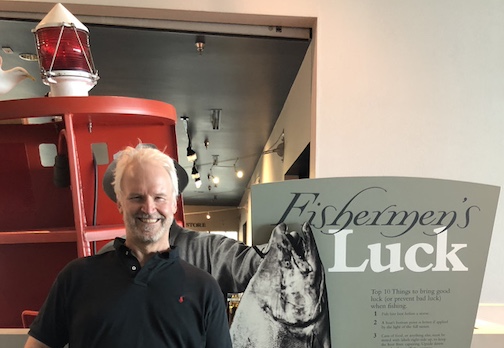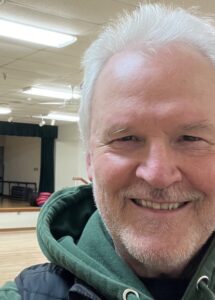Story development sounds like show business?
But it’s more.
It’s a revelation in a small group where people learn the ropes from a professional.
The pro is Nancy McDonald.
Nancy who?
Nancy McDonald has lived a joyful life steeped in the arts. She is an actor, director, performing arts educator and corporate trainer.
As well as having starring roles in over 40 theatre productions and the soap opera All My Children, she founded Shakespeare Stage Company in New York City and The Writer’s Lab in Hollywood.
More like Nancy ‘Coast To Coast’ McDonald.
Our intentionally small group has met at the Lakewood Theater for the past two months, a once a week dive into standing up and telling the story, any story, that needs telling.
The exciting part is hearing stories from people across a wide spectrum tell stories for the first time.
Everyone has one, has a story, but not everyone tells it.
But not on Thursday nights.
And I’m a fan.
Which is why I ask people outside the walls of the Lakewood basement to tell a story.
I give them permission, as if it matters, because ordinary people are reluctant.
I told the dental hygienist I was in class and asked if she had a story to tell while she did her work.
Me: Do you have stories you’ve never told?
Lady: Yes, I do.
Me: Would you tell me one while I’m here?
Lady: I’m taking my secrets to the grave.
Which is fine, but what the hell?
She probably didn’t want to share anything with the rest of the office.
I mean, it’s not like twitter-x where people post all their weird stuff, or Facebook where everything is fabulous.
Me: Well, think about it and maybe tell one the next time I’m in.
Lady: I’ve thought about, and no. I’m taking them to the grave.
I believe her, but still . . .
Landing A Story Under The Lights
When I went up I told a third installment of a serial, my WWII story.
The class is geared for personal story telling and story development.
During and after each telling the rules apply: listen and learn.
The special part is that Ms McDonald knows the drill, lives the drill, and gives the most helpful notes this side of marriage counseling.
What she says to each story teller helps the story unfold better and better.
It’s thrilling to listen and to talk.
My story is personal due to my Army enlistment in the mid-70’s.
What’s it feel like being All You Can Be? Of being an Army Of One?
I didn’t get drafted or recruited. One of my high school buddies decided to go, so we went in on the Buddy Plan.
That lasted three days, then we were assigned to different training platoon.
We didn’t see much of each other after that. (Hey Gary)
In my new group I felt targeted by the Drill Sargents because that’s what they did, target me from the start.
They did it in a good way.
DS: The Army is changing and people like you will lead the effort.
They made training promises, permanent duty station promises.
All I needed to do was extend my enlistment a couple of years.
By the time I heard the pitch I’d already made up my mind and the clock was running.
I was three days into a two year stretch. Call me a fast read.
The odd part was learning the senior staff were all Vietnam Veterans.
Based on my enlistment date, I’d be a Vietnam-Era Vet, a Vietnam-Era Vet who never left the lower 48.
We weren’t appreciated by the real Vietnam Vets.
“We had the Brown Boot Army, the Black Boot Army, and now this goddamn thing,” was a popular view.
“I was a West Point infantry colonel. My father was a West Point infantry colonel when being a colonel meant something.”
I didn’t ask what either of those was supposed to mean, but at least I wasn’t the only under-appreciated E-3.
(The rank of Pfc is always under-appreciated.)
This is a recap of my story last night:
Flying Home: Story Development
During the invasion of Tinian and Saipan some of the troops witnessed the action on Suicide Cliff where women and children leaped to their death to avoid the torture treatment they were told to expect from the Americans.
If they didn’t jump they were pushed; if they ran they were shot by Japanese soldiers and thrown off.
Jimmy watched through binoculars quite a ways away when one of the people in line ran past the soldiers on a stabbing spree with a big knife and disappeared into the jungle with bullets flying.
Weeks later Jimmy found someone in his tent stealing food. It was a Japanese woman with a big knife, a knife similar to one Jimmy had picked up during a struggle in the jungle.
He hadn’t seen a woman alone in over a year and offered her the rest of his ration stash like her was on a date, a deadly date.
From then on she came back for more food and Jimmy made sure he left it where she could easily find it.
They made a connection with math, the international language, when he left a notebook of problems he was having adjusting the radar on the B29 bombers on their fire raids over Japan.
Another connection was trying to save civilian families hiding in caves.
Together they went into the jungle only to find rogue Japanese soldiers had kidnapped you girls.
They tracked them down only to find five of them drunk and bloody.
Each time a soldier left to relieve himself, the two knives went to work.
Five times they left a soldier dead on the ground, then searched for the girls.
What they found instead was a slaughter.
It was there Jimmy and his friend laid their knives down.
She snuck back into the compound with the rest of the civilians, while Jimmy returned to fire bombing missions.
The strange part was what happened after I finished my story and sat down.
(1013 words)






Very powerful to watch your emotion. Good job!
I am really enjoying our Thursday night class and all the heart everyone is bringing.
I think it was something related to a panic attack.
“Is crying allowed in story class?”
Apparently.
Crying in storytelling is allowed! Emotion sets the tone.
Is your blog down? I haven’t received your daily posts.
Blog down. Now up.
A broken blog takes the fun out of the whole ordeal of cooking up a blog post, setting it down, then going with it.
I almost cried.